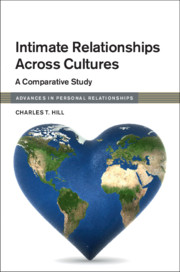Book contents
- Intimate Relationships Across Cultures
- Advances in Personal Relationships
- Intimate Relationships Across Cultures
- Copyright page
- Epigraph
- Contents
- Figures
- Tables
- Spotlights
- Collaborators
- Foreword
- Acknowledgments
- Introduction: Why Was This Book Written?
- 1 How Do We Know What Matters in Intimate Relationships?
- 2 Why Do People Seek Intimate Relationships?
- 3 How Are Intimate Partners Selected?
- 4 What Is Love and How Is Intimacy Expressed?
- 5 How Do Sexual Attitudes and Behaviors Matter?
- 6 What Are the Dynamics of Exchange and Power?
- 7 How Do Couples Cope with Conflict?
- 8 How Do External Factors Matter in Intimate Relationships?
- 9 How Do Intimate Relationships Relate to Well-Being?
- 10 How Do the Predictions Combine in Comprehensive Models?
- 11 How Much Do the Levels of Factors Vary?
- 12 What Are the Implications of the Study?
- 13 How Might the Findings Apply to Other Social Relationships?
- Epilogue: What Future Research Is Needed?
- Glossary of Statistical Terms
- Boston Couples Study Publications
- References
- Index
9 - How Do Intimate Relationships Relate to Well-Being?
Published online by Cambridge University Press: 21 June 2019
- Intimate Relationships Across Cultures
- Advances in Personal Relationships
- Intimate Relationships Across Cultures
- Copyright page
- Epigraph
- Contents
- Figures
- Tables
- Spotlights
- Collaborators
- Foreword
- Acknowledgments
- Introduction: Why Was This Book Written?
- 1 How Do We Know What Matters in Intimate Relationships?
- 2 Why Do People Seek Intimate Relationships?
- 3 How Are Intimate Partners Selected?
- 4 What Is Love and How Is Intimacy Expressed?
- 5 How Do Sexual Attitudes and Behaviors Matter?
- 6 What Are the Dynamics of Exchange and Power?
- 7 How Do Couples Cope with Conflict?
- 8 How Do External Factors Matter in Intimate Relationships?
- 9 How Do Intimate Relationships Relate to Well-Being?
- 10 How Do the Predictions Combine in Comprehensive Models?
- 11 How Much Do the Levels of Factors Vary?
- 12 What Are the Implications of the Study?
- 13 How Might the Findings Apply to Other Social Relationships?
- Epilogue: What Future Research Is Needed?
- Glossary of Statistical Terms
- Boston Couples Study Publications
- References
- Index
Summary
Previous research has indicated that social relationships are important predictors of well-being, but that the quality of the relationships is more important than merely having the relationships (Saphire-Bernstein & Taylor, 2013).
Happiness is viewed by psychologists as an emotional response, while life satisfaction is viewed as a cognitive evaluation (Diener, Oishi, & Lucas, 2002). Across a sample of 123 countries, Tay and Diener (2011) found that positive feelings were most associated with fulfilling social and esteem needs, while life evaluation was most associated with fulfilling basic needs such as food and shelter.
- Type
- Chapter
- Information
- Intimate Relationships across CulturesA Comparative Study, pp. 155 - 172Publisher: Cambridge University PressPrint publication year: 2019

